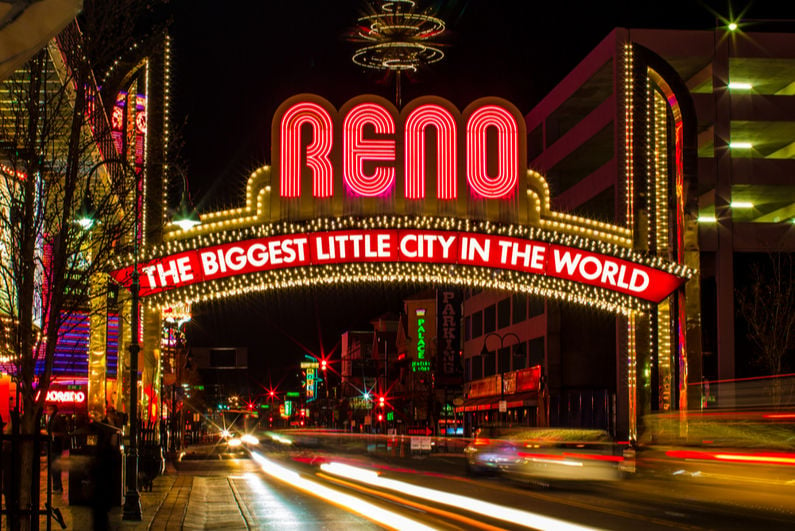Nevada’s Boomtown Reno Casino faces significant penalties from the Nevada Gaming Control Board because the casino and its website acted as a paid affiliate for two Curacao-based online-gambling operations for roughly five months during 2017.
The Nevada Gaming Control Board (NGCB) has filed a formal complaint against Nevada’s Boomtown Reno Casino because of links to offshore online-gambling websites that offer real-money wagering in violation of Nevada law. Boomtown’s parent company, BCH Gaming Reno, LLC, faces significant fines and other possible penalties in connection with the incident, which spanned several months during the spring and summer of 2017.
According to the formal NGCB complaint, Boomtown Reno became interested in providing free-to-play online casino games for visitors to its online site some time around September of 2016. Boomtown first investigated the possibility of developing free-to-play games in-house as a promotional and marketing tool.
That in-house development approach was dismissed as too expensive. However, the casino still wanted some form of online free-play games and tasked the casino’s primary web developer and graphic designer with bringing some form of them to the casino’s home at boomtownreno.com. This effort proved disastrous, as the web developer, with “little, if any, understanding of gaming laws”, then contracted with two different Curacao-based online-casino operations to place direct links to their games on the Boomtown Reno site.
The Boomtown Reno site linked to 15 different “black market” websites from March 2017 to August 17, 2017. On that date, an NGCB agent contacted Boomtown about the illegal offerings, and they were immediately yanked, though the damage had already been done.
Curacao-based operators violate Nevada law
Boomtown Reno’s web developer, unnamed in the complaint, entered into what were, in essence, affiliate agreements with two Curacao gaming operations, Affiliate Edge and Deck Media, placing links to a total of 15 different websites operated by the two companies.
Eleven of the 15 websites linked from the Boomtown Reno site allowed real-money play by any US residents and three of those websites included return links to Boomtown. Three of the 11 sites (not specifically identified as the same three) tagged their own Curacao-based offerings with US flag images and such wordage as “US Friendly Casino” or “US Players Welcome”. Such sites are in clear violation of Nevada gaming law, which forbids any such offerings from being made available to the state’s residents.
These sites are also in contrast to so-called “gray market” sites, meaning international operators that provide service to residents of US states where the law is unclear on offshore, online gambling matters. Most gray-market operators have yanked their services from Nevada and roughly 15 other US states where specific bans now exist.
Boomtown entered affiliate deal
During the roughly five months the real-money games were available via the boomtownreno site, Boomtown received affiliate payments. The NGCB complaint asserts that Boomtown received, through an entity called Evo Advertising, at least one affiliate payment from Affiliate Edge, in the amount of $1,621.03. The NGCB also obtained affiliate player sign-up records showing the customers who had registered and deposited funds on the sites via the Boomtown affiliate links.
Such activity is specifically outlawed in Nevada, where online poker was authorized in 2012. Nevada authorized only online poker, as opposed to slots and other casino-style games, unlike the other US-legal online offerings in New Jersey and Delaware, where those other casino games are offered.
Further, Boomtown Reno was not authorized by the Nevada gaming regulators to offer any sort of real-money gaming, much less the black-market offerings of the Curacao-based sites.
NGCB claims lack of oversight
That a Nevada casino somehow offered links to illicit online-casino offerings in a state where online gambling is such a high-profile topic appears to have stunned the Gaming Control Board investigators and regulators. This passage from the complaint offers insight: “It appears Boomtown ceded complete control concerning links to online gaming on its website to one employee of Boomtown: its graphic and web designer. It appears this person had little, if any, understanding of gaming laws. It further appears that Boomtown exercised little, if any, oversight concerning this employee’s actions with regard to placing links to online gaming on Boomtown’s website.”
Further, the NGCB obtained records of at least two consumer contacts regarding the links to the illicit offshore offerings. Those contacts were dated March 23 and April 28, 2018, respectively, and the casino did not investigate or act on the consumer inquiries. More from the complaint: “Boomtown failed to maintain sufficient level of supervision and control over its website and its employee to prevent links on its website leading to other websites which apparently allowed real money wagering in apparent violation of the [US’s federal] Wire Act.
“Boomtown further failed to inquire into the nature of the links on its website when it received payment from the websites and when a patron of Boomtown questioned the legality of the activity on one of the links.”
Future hearings are yet to be scheduled on the matter, though Boomtown will likely face a significant penalty, given the NGCB’s assertion that the matter reflects badly on the entire Nevada gambling industry. All relevant links have long since been scrubbed from the boomtownreno.com site. The physical Boomtown Reno sits at the far western edge of the Reno-Sparks metro area, near Interstate 80, not far from the California-Nevada border. The casino has long catered to visitors from California’s Central Valley, including such cities as Sacramento and Redding.




